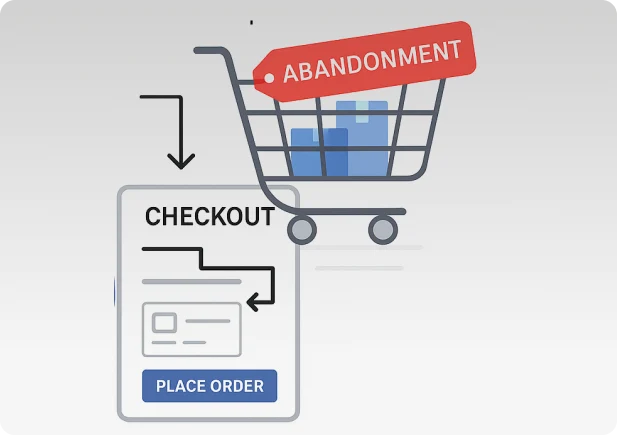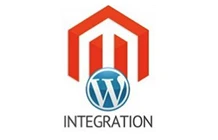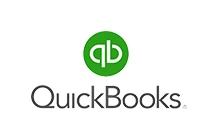Performance-Driven B2B Magento Development for Connected Commerce
Upgrade how your business sells and grows with B2B Magento development built for complex operations like multiple buyers, custom pricing, and smooth system integrations.

Connect With Our Magento Experts
Get Free 2-Hour Consultation!
Solving the Complexities of B2B Commerce with Magento (Adobe Commerce)
Challenge
B2B selling often involves multiple buyers, roles, and approval hierarchies under one account. Without a unified system, managing quotes, permissions, and budgets becomes time-consuming and error-prone.
Our Solution
Through B2B Magento development, we create structured company accounts with parent–child roles, approval chains, and PO tracking. As a certified Magento B2B agency, Folio3 simplifies multi-user management and helps teams handle every layer of corporate buying smoothly.

Challenge
B2B commerce demands personalized pricing, quotes, and catalogs for every customer. Standard setups struggle to adapt to complex pricing rules across different markets or buyer types.
Our Solution
Our Magento B2B development services enable advanced pricing logic, negotiated quotes, and custom catalogs that scale with your business. As an experienced B2B Magento agency, we build Magento solutions that adapt to every buyer, boosting accuracy and customer loyalty.

Challenge
Disconnected ERP, CRM, or inventory systems create data silos, slow order processing, and reporting gaps - critical issues for high-volume B2B operations.
Our Solution
Folio3’s B2B Magento development integrates your store with ERP, CRM, and fulfillment platforms like NetSuite, Microsoft Dynamics, and Salesforce. As a Magento B2B development agency, we automate data flow to keep your ecosystem connected and operations efficient.

Challenge
Managing quotes, recurring orders, and multi-level approvals manually slows down the buying process and increases friction for large clients.
Our Solution
Our Magento B2B developers build automated quote systems, bulk order uploads, and purchase order workflows that simplify complex transactions. Every checkout is designed for faster approvals and frictionless reorders, helping sales teams close deals faster.

Challenge
Large catalogs, traffic spikes, and multiple regional stores can affect site performance and uptime in enterprise B2B setups.
Our Solution
As a full-service B2B Magento development partner, Folio3 optimizes caching, indexing, and hosting architecture for speed and reliability. With certified Magento B2B developers, we ensure your platform stays fast, stable, and ready to scale globally.


Adobe Certified Expert-Adobe Commerce Developer

Adobe Certified Master – Adobe Commerce Architect

Adobe Certified Expert-Adobe Commerce Business Practitioner
B2B Magento Development Services for Measurable Growth
As a results-driven B2B Magento (Adobe Commerce) agency, we craft enterprise-grade solutions that simplify bulk orders, automate approvals, and connect backend systems, enabling seamless digital commerce through end-to-end Magento B2B development services.

Custom B2B Store Development
Build enterprise-grade Magento stores tailored for complex B2B commerce, including multi-buyer accounts, approval workflows, and quote-based pricing – engineered by our certified B2B Magento developers for flexibility and scale.

Magento ERP & CRM Integration
Connect Magento with ERP, CRM, and ERP systems like NetSuite, Microsoft Dynamics, and Salesforce to automate inventory, pricing, and order workflows, a signature strength of our Magento B2B development agency.

B2B Pricing & Quoting Solutions
Enable customer-specific pricing, tiered discounts, and quote negotiations that reflect real B2B sales processes. Our B2B Magento developers configure dynamic pricing rules that increase conversion and simplify order management.

Headless & PWA Commerce
Upgrade your Magento store to a headless architecture with React, Vue, or Next.js frontends, delivering lightning-fast speed, flexible design, and a unified buying experience across all devices.

Multi-Store & Marketplace Setup
Launch multiple regional stores or multi-vendor marketplaces within one Magento backend. Our Magento B2B agency configures multi-domain management, localized catalogs, and shared inventory for seamless global operations.

Magento Performance Optimization
Fine-tune your Magento B2B platform for speed, scalability, and uptime. Through caching, CDN setup, and code refactoring, our Magento B2B developers ensure your store performs reliably under heavy traffic and data loads.

B2B Payment & Checkout Customization
Simplify bulk purchasing, recurring orders, and PO-based payments. Our B2B Magento 2 specialists design flexible checkout flows that support company credit limits, invoice payments, and tax exemptions.

Magento AI & Analytics Enablement
Use AI for smarter operations, from product recommendations and sales forecasting to automated reorders and buyer segmentation. Folio3’s B2B Magento development services embed intelligence across your commerce ecosystem.

Support, Maintenance & Upgrades
Ensure long-term stability with 24/7 Magento support, version upgrades, and proactive performance monitoring. As a trusted Magento B2B development company, we help your platform evolve with your business.
Get Simplified B2B Commerce with Magento
From complex systems to seamless experiences - Folio3 makes it effortless for your business to grow and compete.
Check out our Magento Projects
Folio3 has more than fifteen years of experience in designing and developing B2C and B2B ecommerce solutions and services to companies of different sizes.

- Automotive
- Magento
Multi-Region B2B Growth with Magento

- healthcare
- Magento 2
Custom Magento for Dental Sales Boost

- Life Sciences
- Magento 2
Unified eCommerce for Life Sciences

- Apparel / B2B
- Magento + Netsuite
Magento B2B Portal for Apparel Brand
B2B Magento Development for Enterprise Growth
Complex B2B commerce demands more than transactions – it needs strategy, precision, and systems that scale. Our B2B Adobe Commerce development expertise helps enterprises modernize legacy platforms, integrate ERP, PIM, and CRM systems, and create high-performing digital ecosystems that simplify every layer of B2B operations.
So, don’t treat B2B Magento as just a platform; it’s the backbone of digital growth. Every order, quote, and workflow can run smarter with the right architecture. As a trusted Magento B2B development agency, Folio3 delivers data-driven design, enterprise integrations, and modernization strategies that help global brands sell faster, operate leaner, and grow stronger.

Ready to Build Your B2B Magento Store?
Partner with an enterprise-focused Magento B2B development agency building scalable platforms for complex workflows. From integrations to B2B Magento development services, our certified team delivers smooth execution from planning to launch.
Features That Power the Future of B2B Magento Commerce
As an experienced Magento B2B agency, we focus on creating flexible features that simplify operations and drive growth. From pricing to store management, our B2B Magento solutions improve performance and deliver smoother buying experiences.
Custom Buyer Accounts
Create sub-accounts for departments or teams with role-based permissions and approval controls. Our B2B Magento developers design structured workflows that simplify order visibility and spending limits, helping enterprises manage corporate purchasing efficiently and maintain control across every level of their organization.
Dynamic Pricing Rules
Enable flexible, customer-specific pricing for wholesalers and distributors. As a certified Magento B2B agency, we build dynamic price lists, contract-based rates, and tiered discounts that streamline negotiations, enhance transparency, and strengthen long-term relationships across diverse B2B buyer segments.
Quick Order Management
Simplify repeat and bulk ordering with quick forms, CSV uploads, and one-click reorders. Using advanced B2B Magento services, we help buyers save time while improving efficiency, enabling seamless purchasing workflows that enhance satisfaction and accelerate order processing for returning customers.
Quote and Negotiation
Allow customers to request quotes and negotiate pricing directly online. Our Magento B2B development services automate quote approvals, workflows, and adjustments, enabling faster decision-making, reducing manual handling, and helping sales teams close high-value deals with speed and precision.
Payment and Credit
Offer flexible payment terms, including credit limits, invoices, and POs. Through expert B2B Magento development, we configure secure gateways and automated billing options that improve cash flow visibility, minimize delays, and make transactions more convenient for enterprise-level buyers.
Catalog Personalization Tools
Build tailored catalogs with pricing, assortments, and visibility rules for each buyer group. Our Magento B2B development agency creates personalized shopping experiences that improve relevance, simplify navigation, and strengthen customer loyalty across multiple B2B segments and markets.
Shipping Flexibility Suite
Provide flexible shipping options like multi-address, warehouse-based, and scheduled deliveries. These tools, built by our B2B Magento developers, optimize logistics, reduce manual steps, and ensure efficient order fulfillment for companies managing large, distributed customer networks.
Analytics and Insights
Use built-in dashboards to monitor sales trends, order history, and buyer behavior. Our Magento B2B development integrations convert data into insights that improve forecasting, streamline planning, and drive smarter decisions that sustain measurable B2B growth.
Global Store Management
Run multiple stores, brands, or regions from one Magento/Adobe Commerce platform. As a full-scale B2B Magento agency, we create multilingual, multi-domain environments that centralize operations, reduce costs, and enable seamless expansion for fast-growing enterprise commerce networks.
Find Out How Strong Your B2B Magento Platform Really Is
Get a free project quote. We’ll analyze your current setup, identify key needs, and outline how to improve efficiency and growth.
Our Magento Integration Solutions





















































































Can’t find the Integration Solution you were looking for?
Why Choose Folio3 as Your B2B Magento Development Partner

15+ Years of Proven Expertise
With over 15 years of experience, Folio3 has become a trusted B2B Magento development partner for global enterprises. Our team has delivered hundreds of successful projects built for scalability, performance, and measurable growth.

Certified Magento Professionals
Work with Adobe-certified Magento B2B developers and architects who bring deep technical expertise and real-world commerce experience to every project, from custom integrations to enterprise-grade B2B Magento 2 implementations.

Dedicated Support & Maintenance
As a full-service Magento B2B agency, we provide round-the-clock support, proactive monitoring, and long-term maintenance to keep your platform running smoothly, securely, and ready for scale.
Expert-Led B2B Magento Development Workflow
Every great B2B platform begins with the right workflow. Our experienced Magento B2B developers use proven methods to design, build, and deliver solutions that stay aligned with your business goals and scale confidently with demand.

Project Discovery
Understand goals, workflows, and system dependencies across your B2B ecosystem.

Solution Architecture
Design system connections with ERP, CRM, PIM, and quoting tools for a unified experience.

Custom B2B Development
Build features like multi-account management, pricing rules, and bulk ordering with clean, scalable code.

Testing & Optimization
Run validation across workflows and integrations before deploying your B2B Magento store at scale.

Ambitious Brands Endorse Folio3’s eCommerce Development Services
100+ Magento Projects completed for Enterprises and startups with 100% Satisfaction rate. Our clients love us!

Terri Anne Meyer Head of Digital Marketing
We have been working with Folio3 since 2018. We are extremely fortunate to have found such a fantastic team of people. They are professional, organized, time-sensitive, and their work is stellar. Most recently, we needed support with dynamic schema mark-up and GA4 event integrations.
![]()

Omar M. Al-Midani Co-Chief Executive Officer
As you know our project is quite complicated & involves some fairly intricate customizations. Overall we are very happy with the progress so far. We feel that your team understands our requirements very well & also anticipates issues & provides effective solutions.
![]()

Dinara Etshman Project Manager
The Folio3 team is a pleasure to work with. During the project, they were responsive and their turnaround time was always stellar.
![]()
Frequent Ask Questions?
What makes Magento ideal for B2B eCommerce development?
Magento is built for complex B2B commerce, supporting custom catalogs, tiered pricing, bulk ordering, and multi-account management out of the box. With expert b2b magento development, businesses can automate quotes, integrate with ERP or CRM systems, and deliver a seamless buying experience across distributors, dealers, and corporate clients.
How does Folio3 add value as a B2B Magento agency?
Folio3 is a certified Magento B2B agency with over a decade of experience delivering scalable, enterprise-grade commerce solutions. Our team combines strategic consulting, technical architecture, and hands-on B2B Magento development to create platforms that perform faster, scale smarter, and drive measurable business growth.
Can Magento 2 handle complex corporate account structures?
Yes. With B2B Magento 2 capabilities, you can manage multiple buyers under one company account, set role-based permissions, define approval workflows, and apply unique pricing rules. Our Magento B2B developers customize these functions to match your organization’s hierarchy and operational needs.
What integrations are essential for B2B Magento stores?
Most B2B businesses rely on integrations that connect Magento with ERP, CRM, and PIM systems for inventory, pricing, and order management. Our Magento B2B development services integrate platforms like NetSuite, Microsoft Dynamics, and Salesforce to automate operations and improve real-time visibility across your business.
How can B2B Magento development improve sales and ROI?
With the right B2B Magento development approach, businesses gain higher efficiency, faster transactions, and personalized customer experiences. From automating quotes to streamlining reorders, Magento helps reduce friction and increase revenue - turning your store into a scalable sales engine.
Book a discovery call with our experts.
Send in your details to get instant access to our calendar and book a convenient slot.
Please ensure to send sufficient details about your project so our experts can provide you the most value in the free consultation.

